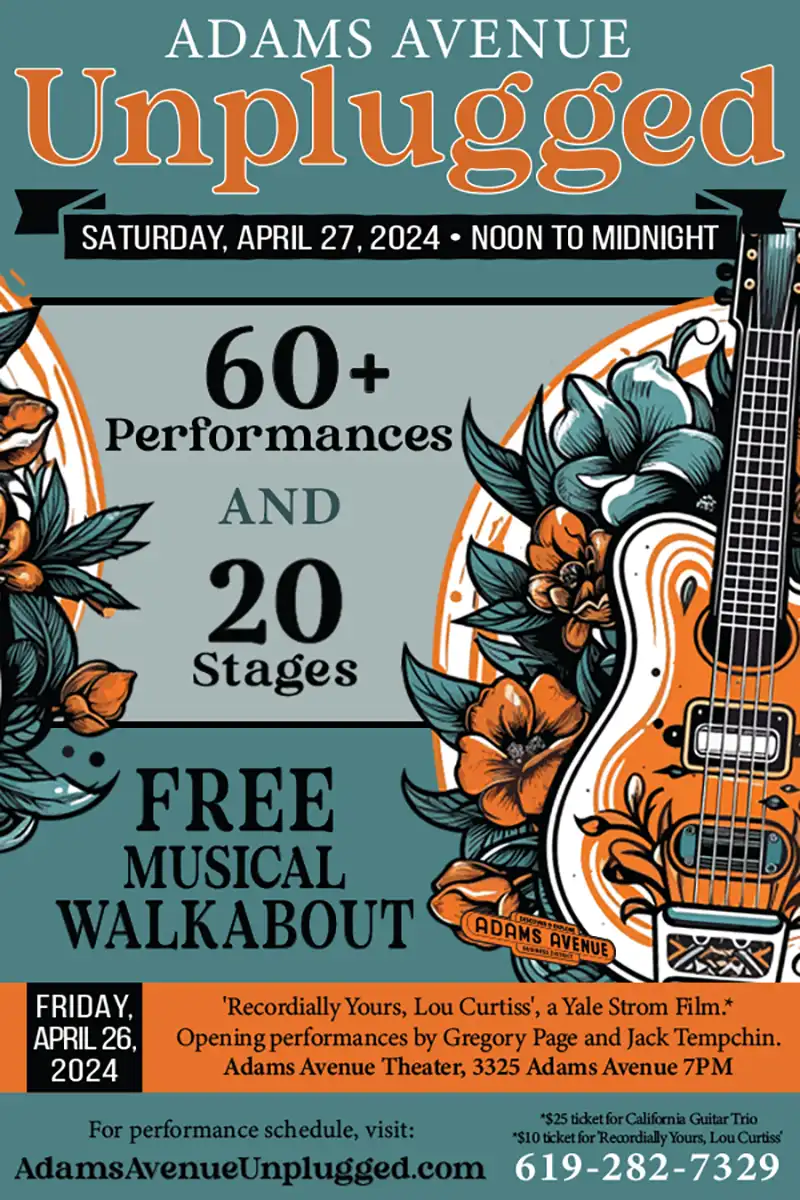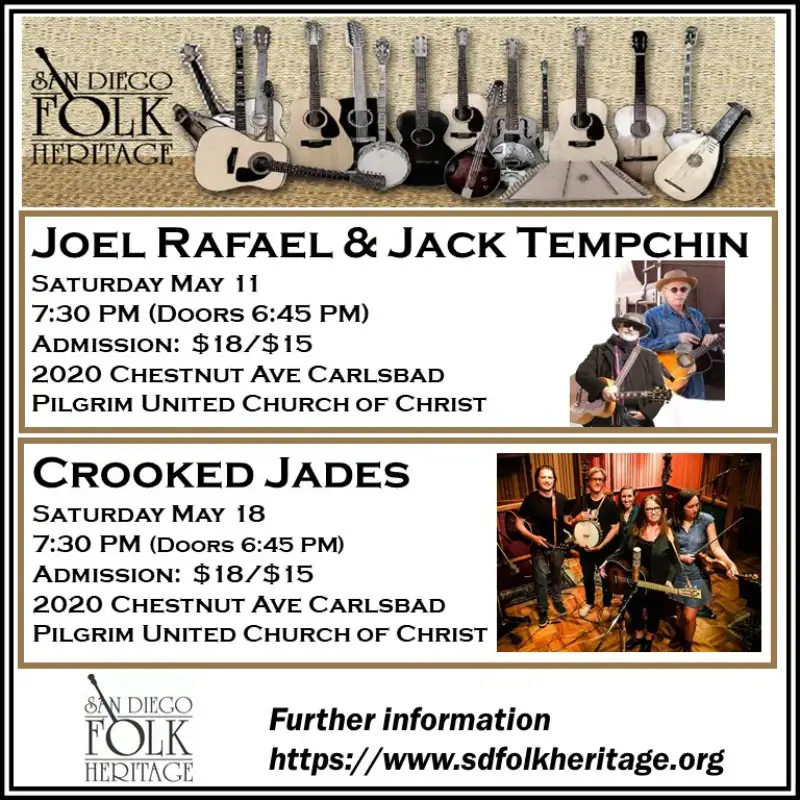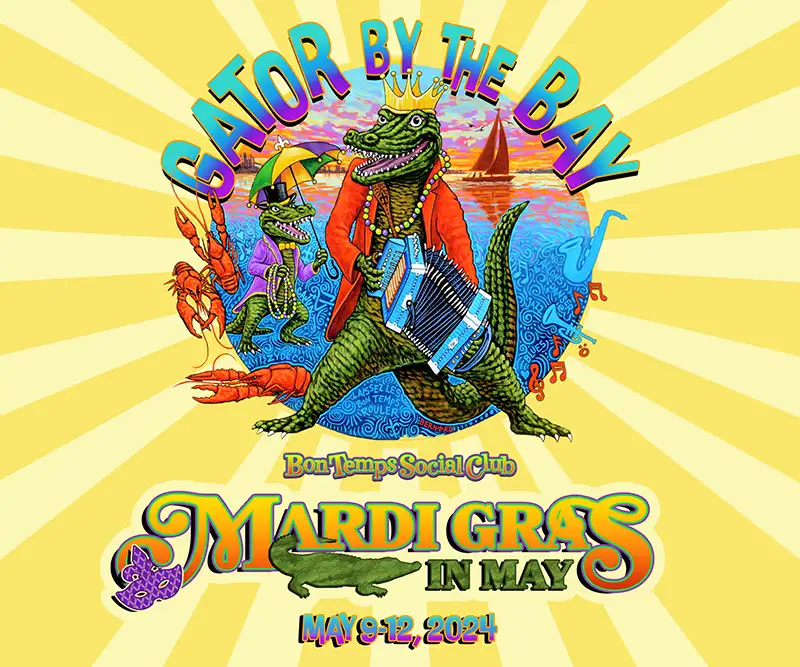Cover Story
Three Chord Justice: Fanning the Flames of Tradition
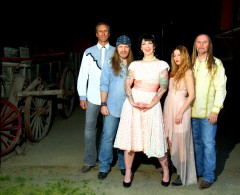
Three Chord Justice: Jeff Houck, Mark Markowitz, Liz Grace, Cheryl and Dave Preston. Photo by Dennis Andersen.
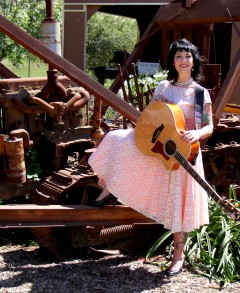
Liz Grace. Photo by Dennis Andersen.
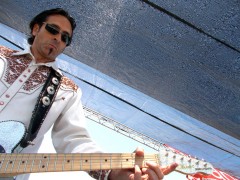
Jeff Houck
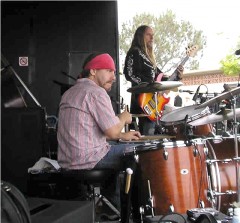
Mark and Dave

Cheryl Preston
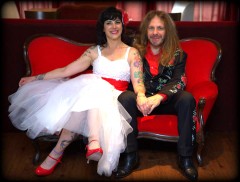
Liz and Mark on their wedding day. Photo by Trisha Henneberg.
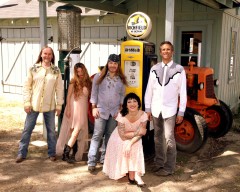
Photo by Dennis Andersen
Justice: [noun] conformity to truth, fact, or reason: correctness.
All you need to write a country song is three chords and the truth. — Harlan Howard
Traditional values and the evolution of consciousness make for uneasy bedfellows in the post-modern world. It’s a living/breathing contradiction, and at its best, a precarious tightrope ride. According to Wikipedia, traditional values “refer to those beliefs, moral codes, and mores that are passed down from generation to generation within a culture, subculture, or community.”
Traditional values in American culture often speak of being “God-fearing,” “upstanding/law-abiding,” and “Christian,” as if those attributes were one and the same. Coincidently, those are three of the themes most commonly found in traditional American country & western music — right up there with mama, love’s trials and tribulations, unfurling the flag, and the loss of a beloved pet on the family farm. “Tradition” in the precise manner that Tevye relates through his character in the Broadway musical Fiddler on the Roof.
However, in the country music capital of the world, NashVegas, there’s been a 40-year homicidal war waged against traditional country music, and that change in style reflects an across-the-board shift of what has happened throughout the music industry — in fact, throughout the entire infotainment spectrum of theatre, cinema, television, music, books, and magazines. There’s a lockdown on content and ideas throughout the media, with only the most affluent allowed into the big leagues (and the primo reason why the Internet needs to be uncensored by government). It’s a syndicate, with the parameters of the racket laid out superbly in the 1990 exposé Hit Men: Power Brokers and Fast Money Inside the Music Business by Fredric Dannen.
The past harbors a strong seduction, serving as a powerful ally to the ego, against an unknown future. The past provides comfort and a sense of belonging, providing a baseline from which to measure our current reality. The tried and true traditions of the past are also capable of providing a solid foundation upon which to build your enterprise (i.e., saving you from reinventing the wheel), and those are some of the guiding principles that fuel roadhouse veterans Three Chord Justice.
*********************
It’s a balmy summer evening in San Diego, even if the calendar insists that it’s the penultimate week of winter. Yes, we may live in a world of constant flux, but one thing remains the same: everybody has a dream, particularly honky-tonk angel Liz Grace and her compadres, which constitute Three Chord Justice.
Blessed with an emotive soul and a tenacious demeanor, Grace is clearly the star of the show, providing a stunning focal point with her flowing gowns, tattooed arms, beauty queen looks, and pipes that just won’t quit. Musically, the band is steered by the lightning fast fingers of guitarist/ songwriter/producer Jeff Houck, and supported by the rock solid rhythm section of drummer Mark Markowitz and bassist Dave Preston. Complemented by the harmony vocals and percussion of Cheryl Preston, the all-important role of pedal steel is currently in “rotation,” after the departure of founding member Tom Wolverton in 2014. Think of Nashville circa ’52, or Bakersfield ’63, and you’ve got the stylistic coordinates of the TCJ sound.
The band came together in May of 2008 after Houck responded to an ad by Grace on Craigslist. “It said something like ‘Don’t respond to me if you don’t want to play traditional country music — I am not messing around!’ Because it has to be traditional country music, and a specific type,” says Grace. “And I don’t want to do anything else. It has to have pedal steel; the lead player and the singer and the guitar and the melody have to be on top of the rhythm section — with nothing crazy on the bass. Listen to ‘Jolene’ by Dolly Parton. That’s all you have to do, because she floats like an angel.
“And simple arrangements. I-IV-V. Dude, I-IV-V is tattooed on my arm — that is how meaningful that pattern is. I’ve gotten all of these tattoos since we formed the band. The first one I got [on my right arm] says support live music: because that’s what I believe in doing.”
As a measure of how much ink she’s had applied to both of her arms in the last four years, compare the cover photos on the back of her first solo CD No Justice in 2010, and TCJ’s latest from 2014, One | Four | Five.
“They’ve all been done at Avalon Tattoo in P.B. and Ace Tattooing Company in O.B. These are really beautiful, and they’re all very, very meaningful to me. I have all of this real estate: what am I doing with it? I got my first tattoo when I was 35,” she says, pointing to a tat that says Honky Tonk Princess. “See, that’s how loudly I want to say it. I mean I’m willing to wear this on my body for the rest of my life. That’s who I am. And yeah, it’s a little bit narcissistic to put it on your body and tell everybody, but who cares? It’s my body.”
Grace’s life so far has played out like a classic Johnny Cash narrative — sort of a cross between what happens when you get out of Folsom Prison and fall into a ring of fire. Born in Las Vegas, Nevada, her parents divorced before she was two. She spent her formative years in Great Falls, Montana, as an only child with her mom, before going off to college in Missoula and eventually working for seven years as a prison guard at the Missoula County Detention Facility. She made her professional debut fronting the Gypsy Fisherman in 1989 and hasn’t looked back since.
“Now how country is that?” jokes Houck. “With our song ‘Hillbilly Justice,’ Liz will sometimes introduce that song and say, ‘this is about my time in prison.’ Of course, her time in prison wasn’t as an inmate. Merle Haggard may have done prison time, but so did Liz.”
“Well, at the time I was living in a cabin in the woods with a gorgeous but incredibly dumb guy,” she says laughing. “And I needed someplace else to live. So I saw an ad in the paper: ‘11 dollars an hour, come be a prison guard, have county benefits and insurance.’ At the time it was fantastic and I loved that job. You learn a lot about people.”
And the lady knows how to shoot a gun. “Well, we don’t carry guns inside the jail,” says Grace. “I’ll shoot everything except a gun, less lethal weapons: rubber bullets, pepper spray, tasers. I’ve gone toe-to-toe with murderers and rapists. I worked the night shift for years and years. Twelve-hour shifts from 6:30pm to 6am.”
*****************
Blessed with a righteous tone and tasteful choices on his Telecaster, Houck was born in Buffalo, but only spent six months there before his parents moved and “I went to the home of country music — Boston, Massachusetts. In my father’s den, that was the home of country music. I spent the next 30 years in Boston before coming out here in ’89. I made the big move that everybody talks about on the East Coast: ‘Oh, I’m going to live in Southern California for a few years, and I’m still here; I never went back.”
Houck went through the usual route of learning how to play guitar as a teenager, and after graduation quickly became a veteran of the local bar circuit. “My first gig in front of people was in the fifth grade, and I had a little three-piece band. I played guitar and one of my neighbor friends, Richard Morel, played congas, and Chris Witcomb also played guitar. The first song that we ever played in our school gym was ‘The Age of Aquarius’ by the Fifth Dimension. And what’s interesting is Richard Morel, who now lives in Washington D.C.; he’s a well-known producer. He does a lot of re-mixes for artists like Madonna, Cyndi Lauper — that was his first gig, too.
“I grew up in that great guitar period, right? I’m playing guitar in the mid-and-late ’60s, early ’70s. Jeff Beck was my guy. He was just everything to me. Clapton, and Page — I’m a huge Zeppelin fan, but Beck really grabbed me, because he was doing so much stuff that was left of center. As a guitarist, Beck intrigued me, inspired me, baffled me. Because when Blow by Blow came out I had my Cherry Sunburst Les Paul Deluxe, and I probably went through three copies of that LP learning his material, because that’s how you did it back then. I was, and still am, a huge Doobie Brothers fan, and I think one of the things I love about the Doobie Brothers is that crossover thing that they did, ’cause they were a rock band, but they had a lot of dobro and banjo — bluegrassy stuff, great harmonies. And of course, the Allman Brothers: I’m a huge fan of Duanne Allman and Dicky Betts.
“But what was going on parallel to that was my dad was really into what we would call old school country. It was Johnny Cash, it was Loretta Lynn, and my dad is a huge train guy. He’d listen to Eddy Arnold and the ‘Wabash Cannonball’ and all that stuff. So, I’m supposed to be in the den studying and I’ve got the stereo turned way down and I was obsessed as a young kid with Johnny Cash at San Quentin and At Folsom Prison, ’cause he’s cussing. [laughs] I’m ten-years-old and getting that I-IV-V, Tele-picking thing. And my dad watched Hee Haw all the time, so that turned me on to Buck Owens and Don Rich. And it’s funny, because today it probably would be considered child endangerment or something: ‘God, can we put something else on?’ But what I realized was, I’m watching Chet Atkins, I’m watching Roy Clark, and getting exposed to a lot of that stuff at a young age and even though I wasn’t really playing it, it was kind of seeping into my head. But the biggest band in my total existence, when I was little, was the Beatles and The Beatles’ Second Album. What’s interesting on those early Beatles albums is how much they’re influenced by Carl Perkins — you hear it in George Harrison’s playing.”
Clearly the masters of classic country made an indelible mark upon Houck and the members of TCJ in terms of shaping their sound, and if you’re looking to kick up your heels on a Saturday night, there is no finer band to dance to in San Diego. They play with finesse and subtlety, and as an ensemble they are tight as a bullwhip. But are there new places that TCJ can take the form? Or is it even possible to be innovative within a genre that defined itself over 60 years ago? Houck seems to think so: “Yeah, I think you can always stretch the boundaries a little bit. But the fans of that music and the people who enjoy it and dance to it, they certainly have some boundaries that they want to perform within. And this is one of the reasons why Hank Williams III has two different bands. There’s Assjack, which is the metal thing, and there’s the true, traditional country thing.”
Well, much like his grandson, some fans have gone so far as to credit Hank Williams, Sr. as being one of the original punk rockers of music. And you know what they say about talent skipping a generation sometimes: Hank Jr. (Bocephus) is an excellent example of what’s “gone wrong” in the last 40 years of the country/western idiom.
“I think it did skip [a generation] there,” agrees Houck. “Now if you listen to some of Hank Jr.’s earlier stuff, it took a turn. When Nashville really started getting commercially ‘bad.’”
It’s a familiar story in show business: how do you choose to play the game and gain recognition, to get gigs, and build an audience? And if you work outside of conventional channels, how much do you crowd-source your material as opposed to following the beat of your own heart with your art? Grace says, “Oh, gosh, hopefully they’re one and the same. But most of all, our music has to ‘twang.’ The twang has to supercede the rhythm. When you listen to it you have to immediately think ‘country music.’ And you have to think ‘old country music.’ When I turn on [contemporary] ‘country radio,’ I don’t think country music immediately. I think ‘turn it off.’ And I’ve tried, man, I have tried to listen to an entire Florida Georgia Line album, because it’s no fun to diss Nashville, and new country music, when you haven’t really listened to it.”
******************
When Three Chord Justice formed, Houck was the only member of the group who was married. But after Grace married their drummer (and thus became “Mrs. Markowitz”), and the bassist married the harmony singer, Houck says he now refers to TCJ as the “Fleetwood Country Mac.”
Grace: “I was not married when I met Jeff and I thought that I never would get married. I thought the whole idea was just insane. All I wanted to do was gig and play shows. And never solo, never duo, always with a band. That’s an important point to make about me: I’m not into the solo thing. I dig the collaboration and the karmic intensity and the interaction that I feel when everybody is doing their thing in this symbiotic way.
“But being married to Mark is fantastic. We always talk about how ‘wouldn’t it be terrible if you actually sucked? If you didn’t know what you were doing?’ And I had to say, ‘oh, you were amazing!’ Mark really is amazing; he’s got rhythm so deep inside his body that it just comes out in this way that is so beneficial to the band. And we never argue about what we’re going to do on the weekends, because we’re going to play shows. I don’t care if it’s the VFW, or Gator by the Bay, or Pappy & Harriet’s — if there’s an opportunity to play a show, everything stops. And Mark wants exactly the same things I do, we even put it into our wedding vows.” The two of them even formed a side project, the equally accomplished Liz Grace & the Swing Thing, which picks up the slack in their gig schedule when Three Chord Justice isn’t working.
Houck: “So, two marriages since the band got together. And I just slut around with whatever steel player is in the band: my wife gave me permission. But another thing I should mention is that Dave and Cheryl have their own company, it’s called the T-Shirt Factory/On Track Printing, in Oceanside. Dave did all the graphics and artwork on the CD. Tim Whitehouse at Taylor Guitars does all the photography; I worked at Taylor for nine years (2003—2012) as the electronics department manufacturing manager.
“Tom Wolverton is the guy that plays all the pedal steel on the album. He does all the dobro and he’s a master, he’s unbelievable. But he left the band about a year ago. I’m sure we’ll do some more gigs in the future, but Tom is really, really into old-timey, string band music. Tom was with us for five years and he brought such a piece of the puzzle with him. And he’s got a great ear for harmony.
“At the moment there’s no permanent pedal steel man. Randy Hess plays with us about 80 percent of the time. Randy’s a Nashville pro, who’s basically retired. Doug Meyer is another guy who plays with us. So does Rick Schmidt, who plays with the California Rangers, Kevin Ryan, and Dave Brezinski. There are only about six guys in San Diego that are ‘A’ grade, and when Liz and Mark got married, every one of them were in attendance. The joke was ‘God help us if there’s a fire in this building, or an earthquake, because the entire Southern California steel player population is going to be wiped out!’ because they’re all in the room.”
“And there’s a recipe for playing for this particular crowd. Our bass player Dave is a veteran of this stuff. He played in the Working Cowboy Band and Rocket Rodeo. One of the things that Dave brought to the band was to educate us a little bit: you’ve got to play a cha-cha in every set. You’ve got to play a waltz, you’ve got to play a couple of shuffles. Dave taught us how to play in these places, he really did.”
And regarding the other Preston in the group, Grace has this to say about her singing partner: “Cheryl is pretty awesome. She’s a true soprano, with a whole toolbox available above my highest range. Her hubby Dave joined the band first, and when she asked to audition, Dave didn’t even know she could sing. We were all pretty floored when she killed it right out of the gate. Her vocals on the CD are so lovely, with our voices complementing each other perfectly! I’m happy to have her with me onstage, and her flawless and tasty percussion really adds a uniqueness to our sound.”
********************
Three Chord Justice recorded their first CD of country standards and favorites in 2010, titled Undercover Justice. Their first priority was to have something that demonstrated how the band sounded in order to score some gigs. That strategy paid off, because almost immediately the band was playing at the Gator by the Bay festival and securing first prize at the Viejas Big Country Showdown. “And I’ll tell you something,” says Houck. “It’s pretty nice getting paid $10,000 in cash in a casino.
“And then we ended up taking third place at the Ultimate Music Challenge and those events raised us to a whole other level, opened us up to all the summer concert series festivals, things that a lot of other bands in our genre haven’t been able to breakthrough to.”
Is it tough getting the attention of club owners? “Country is a scary word,” says Grace. “It doesn’t need to be, but it is. Because they associate it with what they hear on the radio.”
“It’s kind of a conundrum,” says Houck. “Because people tend to think of country & western as an oversimplified form of music, because there’s not a billion chords in every song, or a ton of changes. But, in actuality, it’s very complicated in its simple-ness. I know that music’s an art form, and you don’t want to be too judgmental, but what makes a band good? Playing in tempo, singing in tune, where everyone is capable of performing tasteful solos. I have a marketing term: fuel-injected honky tonk. We’re Dwight Yoakum, but we’re female fronted.”
Grace: “There was always something tragically wrong about what I was seeing, before I found Jeff. Maybe I just wasn’t seeing the right bands, but I would go to see a band and go, ‘Oh my God, that’s so what I don’t want to do.’ I got really lucky when I found Jeff.
“I’m just so satisfied with where the band is musically. This is what I wanted from country music and from this band, and the only place to go is up. The only place to go is more songs, more tours, bigger bigger bigger, better better better. I just couldn’t be happier with the whole thing.
2014 saw the band record their second CD One | Four | Five, which showcased the original songs of Grace, Houck, and Preston, and it’s starting to gain them an audience overseas, with Houck joking that “we’re becoming superstars in Dublin and Quebec.” Grace: “We’re getting radio play across the pond, and we would love to go to Europe because people just lose their minds for western American country music. They just love it.
“It is ours, isn’t it, this music? No one else has created this, and I’d love to share that with people in Western Europe. Boy, that would be so much fun.
“So, we’d love to cross the pond. We want to start working on the next album — it’s already starting to gel. We have some very prolific songwriters in the band: Dave Preston, Jeff, myself. So, between all of us we’re starting to push toward writing the second album.
It would appear that the world outside of San Diego is ready for Three Chord Justice.
Grace: “Of course it’s possible, let’s go there right now! Let’s get on the bus and go! Patience is a virtue, but I’m not the most patient person in the world. Who do I have to call?” At the rate TCJ is going, it’s the world that’s going to be calling them.
Catch Three Chord Justice at the Renegade Bar (April 3 & 4), the Acoustic Coronado Ferry Summer Concert Series (April 5), Pappy & Harriet’s Pioneertown Palace (April 10), Mother’s Saloon in Ocean Beach (April 12), Rosie O’Grady’s Pub for the Adams Avenue Unplugged Festival (April 26), and the Gator by the Bay Music Festival (May 10). For more information go to www.threechordjustice.com
[Ed. note: Pedal steel player Doug Meyer passed away on March 25, a few days before we went to press. He was an accomplished musician who played with many bands around town. The San Diego Troubadour sends its condolences to Mr. Meyer’s family, friends, and fans. The music community mourns his passing.]


